Criminal Procedure in Sri Lanka: Rights, Arrest, and Legal Procedures
VerifiedAdded on 2020/07/23
|7
|2038
|29
Homework Assignment
AI Summary
This assignment delves into the realm of criminal procedure, focusing on the legal processes and frameworks within the context of Sri Lankan law. It begins by outlining the initiation of criminal charges, emphasizing the defendant's rights, particularly the right to legal counsel when in police custody. The assignment then explores the distinctions between bailable and non-bailable offenses, clarifying the procedures for arrest and detention. Further, it discusses situations where arrests can be made without warrants. The assignment also examines the concept of joinder in criminal law, specifically in relation to civil procedure, and analyzes instances where individuals are exempt from arrest, such as during parliamentary proceedings. Additionally, the assignment clarifies the rights and duties of police officers regarding arrest, custody, and the prevention of escape from lawful custody, along with the legal consequences of escape attempts. The document also includes a comprehensive list of references, including books and journal articles that support the information.

Criminal Procedure
Paraphrase This Document
Need a fresh take? Get an instant paraphrase of this document with our AI Paraphraser
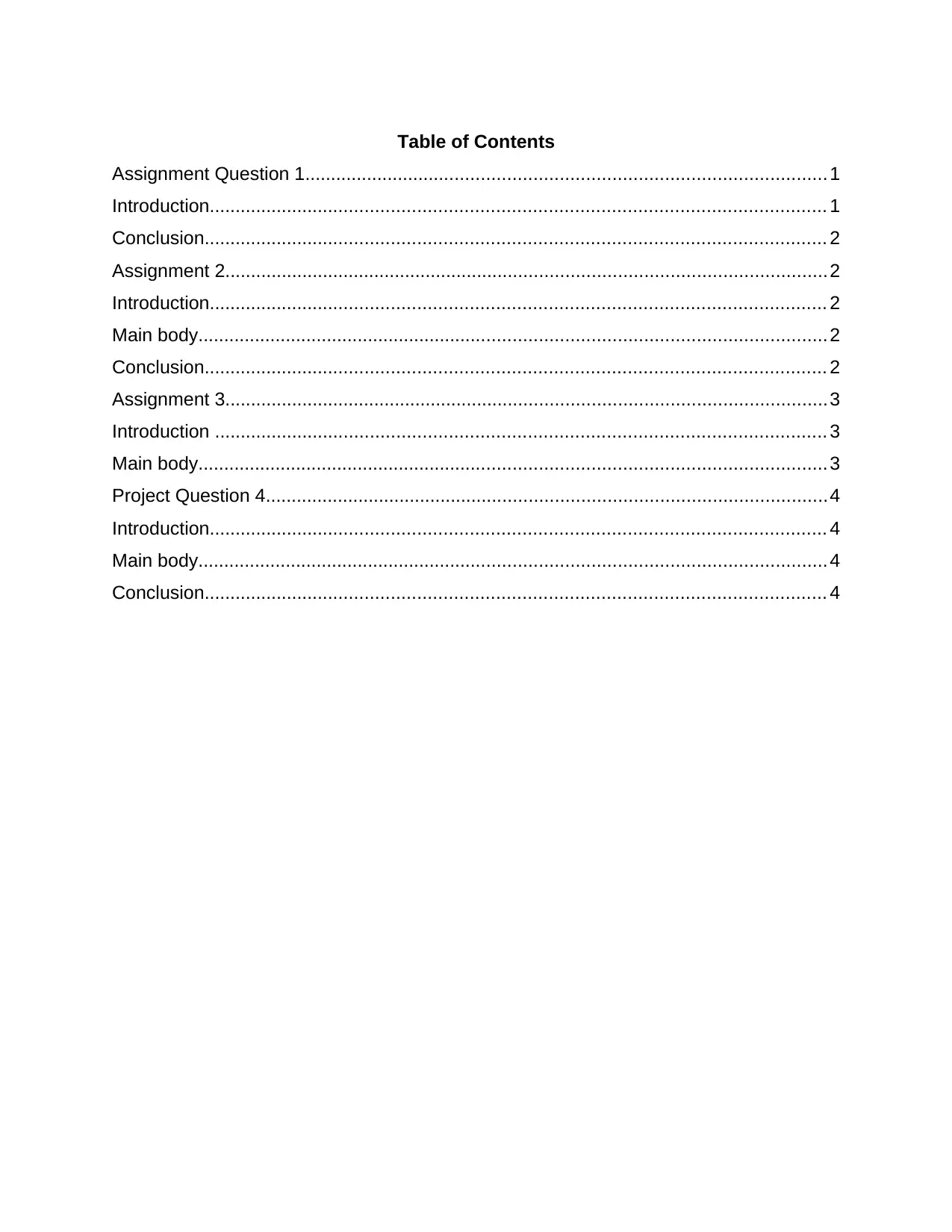
Table of Contents
Assignment Question 1.................................................................................................... 1
Introduction...................................................................................................................... 1
Conclusion....................................................................................................................... 2
Assignment 2....................................................................................................................2
Introduction...................................................................................................................... 2
Main body.........................................................................................................................2
Conclusion....................................................................................................................... 2
Assignment 3....................................................................................................................3
Introduction ..................................................................................................................... 3
Main body.........................................................................................................................3
Project Question 4............................................................................................................4
Introduction...................................................................................................................... 4
Main body.........................................................................................................................4
Conclusion....................................................................................................................... 4
Assignment Question 1.................................................................................................... 1
Introduction...................................................................................................................... 1
Conclusion....................................................................................................................... 2
Assignment 2....................................................................................................................2
Introduction...................................................................................................................... 2
Main body.........................................................................................................................2
Conclusion....................................................................................................................... 2
Assignment 3....................................................................................................................3
Introduction ..................................................................................................................... 3
Main body.........................................................................................................................3
Project Question 4............................................................................................................4
Introduction...................................................................................................................... 4
Main body.........................................................................................................................4
Conclusion....................................................................................................................... 4
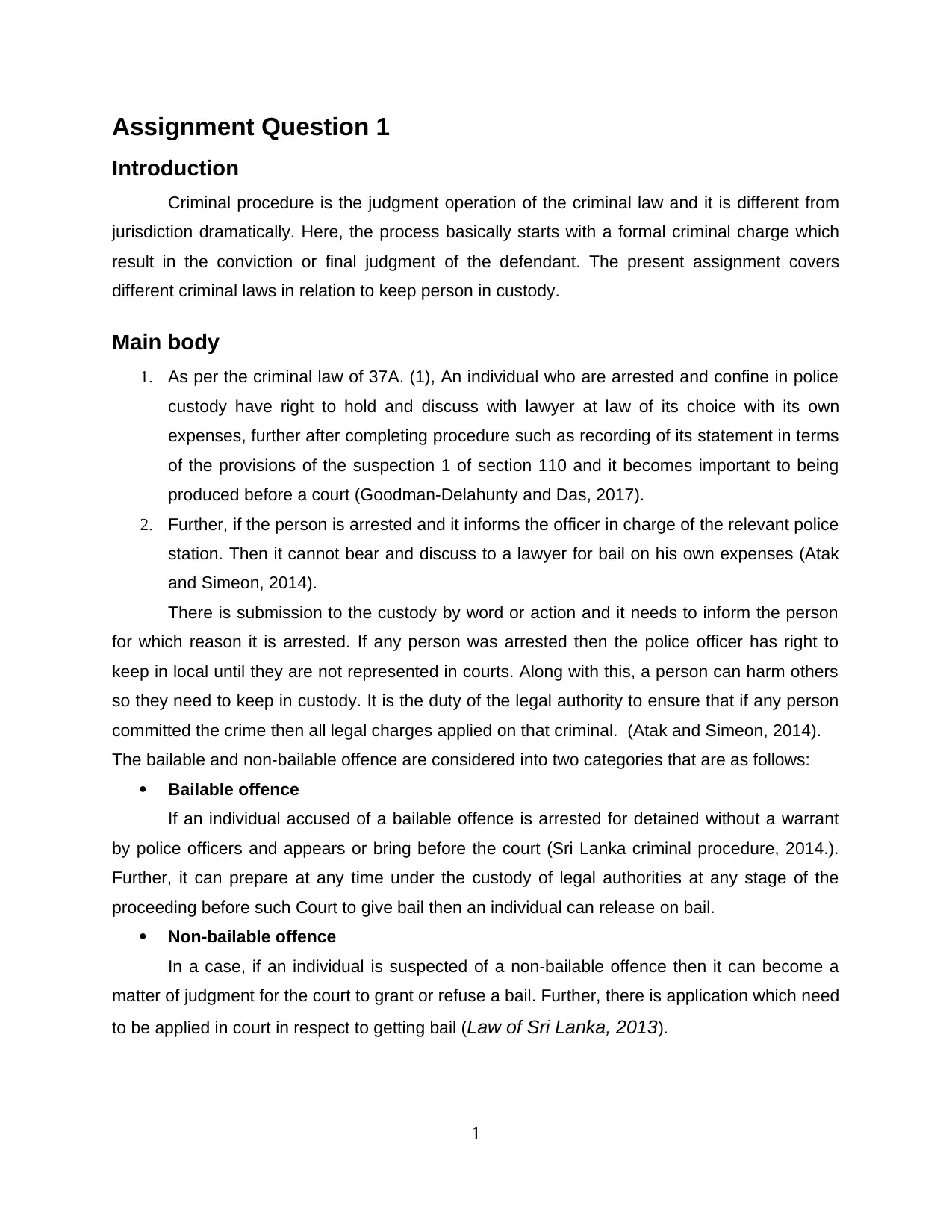
Assignment Question 1
Introduction
Criminal procedure is the judgment operation of the criminal law and it is different from
jurisdiction dramatically. Here, the process basically starts with a formal criminal charge which
result in the conviction or final judgment of the defendant. The present assignment covers
different criminal laws in relation to keep person in custody.
Main body
1. As per the criminal law of 37A. (1), An individual who are arrested and confine in police
custody have right to hold and discuss with lawyer at law of its choice with its own
expenses, further after completing procedure such as recording of its statement in terms
of the provisions of the suspection 1 of section 110 and it becomes important to being
produced before a court (Goodman-Delahunty and Das, 2017).
2. Further, if the person is arrested and it informs the officer in charge of the relevant police
station. Then it cannot bear and discuss to a lawyer for bail on his own expenses (Atak
and Simeon, 2014).
There is submission to the custody by word or action and it needs to inform the person
for which reason it is arrested. If any person was arrested then the police officer has right to
keep in local until they are not represented in courts. Along with this, a person can harm others
so they need to keep in custody. It is the duty of the legal authority to ensure that if any person
committed the crime then all legal charges applied on that criminal. (Atak and Simeon, 2014).
The bailable and non-bailable offence are considered into two categories that are as follows:
Bailable offence
If an individual accused of a bailable offence is arrested for detained without a warrant
by police officers and appears or bring before the court (Sri Lanka criminal procedure, 2014.).
Further, it can prepare at any time under the custody of legal authorities at any stage of the
proceeding before such Court to give bail then an individual can release on bail.
Non-bailable offence
In a case, if an individual is suspected of a non-bailable offence then it can become a
matter of judgment for the court to grant or refuse a bail. Further, there is application which need
to be applied in court in respect to getting bail (Law of Sri Lanka, 2013).
1
Introduction
Criminal procedure is the judgment operation of the criminal law and it is different from
jurisdiction dramatically. Here, the process basically starts with a formal criminal charge which
result in the conviction or final judgment of the defendant. The present assignment covers
different criminal laws in relation to keep person in custody.
Main body
1. As per the criminal law of 37A. (1), An individual who are arrested and confine in police
custody have right to hold and discuss with lawyer at law of its choice with its own
expenses, further after completing procedure such as recording of its statement in terms
of the provisions of the suspection 1 of section 110 and it becomes important to being
produced before a court (Goodman-Delahunty and Das, 2017).
2. Further, if the person is arrested and it informs the officer in charge of the relevant police
station. Then it cannot bear and discuss to a lawyer for bail on his own expenses (Atak
and Simeon, 2014).
There is submission to the custody by word or action and it needs to inform the person
for which reason it is arrested. If any person was arrested then the police officer has right to
keep in local until they are not represented in courts. Along with this, a person can harm others
so they need to keep in custody. It is the duty of the legal authority to ensure that if any person
committed the crime then all legal charges applied on that criminal. (Atak and Simeon, 2014).
The bailable and non-bailable offence are considered into two categories that are as follows:
Bailable offence
If an individual accused of a bailable offence is arrested for detained without a warrant
by police officers and appears or bring before the court (Sri Lanka criminal procedure, 2014.).
Further, it can prepare at any time under the custody of legal authorities at any stage of the
proceeding before such Court to give bail then an individual can release on bail.
Non-bailable offence
In a case, if an individual is suspected of a non-bailable offence then it can become a
matter of judgment for the court to grant or refuse a bail. Further, there is application which need
to be applied in court in respect to getting bail (Law of Sri Lanka, 2013).
1
⊘ This is a preview!⊘
Do you want full access?
Subscribe today to unlock all pages.

Trusted by 1+ million students worldwide
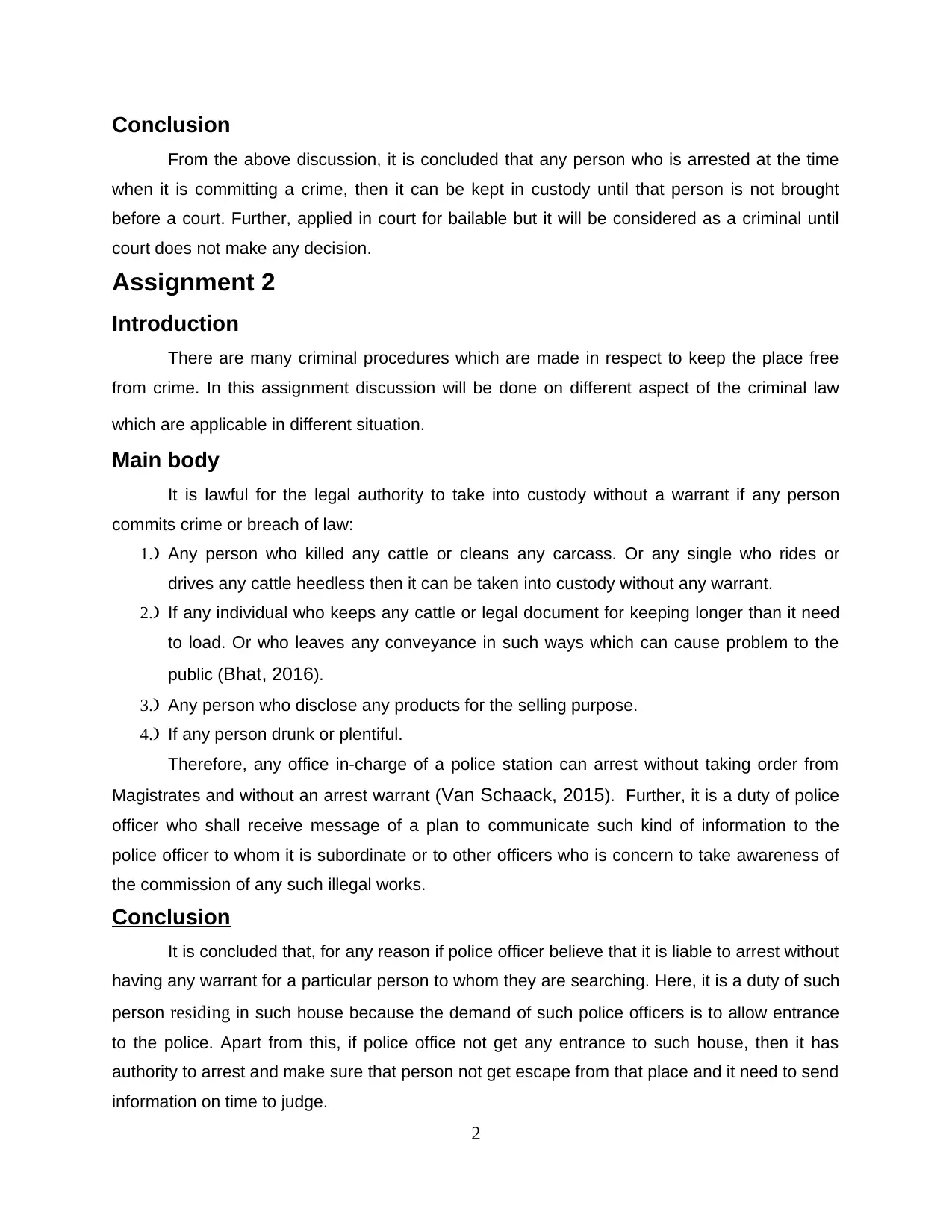
Conclusion
From the above discussion, it is concluded that any person who is arrested at the time
when it is committing a crime, then it can be kept in custody until that person is not brought
before a court. Further, applied in court for bailable but it will be considered as a criminal until
court does not make any decision.
Assignment 2
Introduction
There are many criminal procedures which are made in respect to keep the place free
from crime. In this assignment discussion will be done on different aspect of the criminal law
which are applicable in different situation.
Main body
It is lawful for the legal authority to take into custody without a warrant if any person
commits crime or breach of law:
1.) Any person who killed any cattle or cleans any carcass. Or any single who rides or
drives any cattle heedless then it can be taken into custody without any warrant.
2.) If any individual who keeps any cattle or legal document for keeping longer than it need
to load. Or who leaves any conveyance in such ways which can cause problem to the
public (Bhat, 2016).
3.) Any person who disclose any products for the selling purpose.
4.) If any person drunk or plentiful.
Therefore, any office in-charge of a police station can arrest without taking order from
Magistrates and without an arrest warrant (Van Schaack, 2015). Further, it is a duty of police
officer who shall receive message of a plan to communicate such kind of information to the
police officer to whom it is subordinate or to other officers who is concern to take awareness of
the commission of any such illegal works.
Conclusion
It is concluded that, for any reason if police officer believe that it is liable to arrest without
having any warrant for a particular person to whom they are searching. Here, it is a duty of such
person residing in such house because the demand of such police officers is to allow entrance
to the police. Apart from this, if police office not get any entrance to such house, then it has
authority to arrest and make sure that person not get escape from that place and it need to send
information on time to judge.
2
From the above discussion, it is concluded that any person who is arrested at the time
when it is committing a crime, then it can be kept in custody until that person is not brought
before a court. Further, applied in court for bailable but it will be considered as a criminal until
court does not make any decision.
Assignment 2
Introduction
There are many criminal procedures which are made in respect to keep the place free
from crime. In this assignment discussion will be done on different aspect of the criminal law
which are applicable in different situation.
Main body
It is lawful for the legal authority to take into custody without a warrant if any person
commits crime or breach of law:
1.) Any person who killed any cattle or cleans any carcass. Or any single who rides or
drives any cattle heedless then it can be taken into custody without any warrant.
2.) If any individual who keeps any cattle or legal document for keeping longer than it need
to load. Or who leaves any conveyance in such ways which can cause problem to the
public (Bhat, 2016).
3.) Any person who disclose any products for the selling purpose.
4.) If any person drunk or plentiful.
Therefore, any office in-charge of a police station can arrest without taking order from
Magistrates and without an arrest warrant (Van Schaack, 2015). Further, it is a duty of police
officer who shall receive message of a plan to communicate such kind of information to the
police officer to whom it is subordinate or to other officers who is concern to take awareness of
the commission of any such illegal works.
Conclusion
It is concluded that, for any reason if police officer believe that it is liable to arrest without
having any warrant for a particular person to whom they are searching. Here, it is a duty of such
person residing in such house because the demand of such police officers is to allow entrance
to the police. Apart from this, if police office not get any entrance to such house, then it has
authority to arrest and make sure that person not get escape from that place and it need to send
information on time to judge.
2
Paraphrase This Document
Need a fresh take? Get an instant paraphrase of this document with our AI Paraphraser
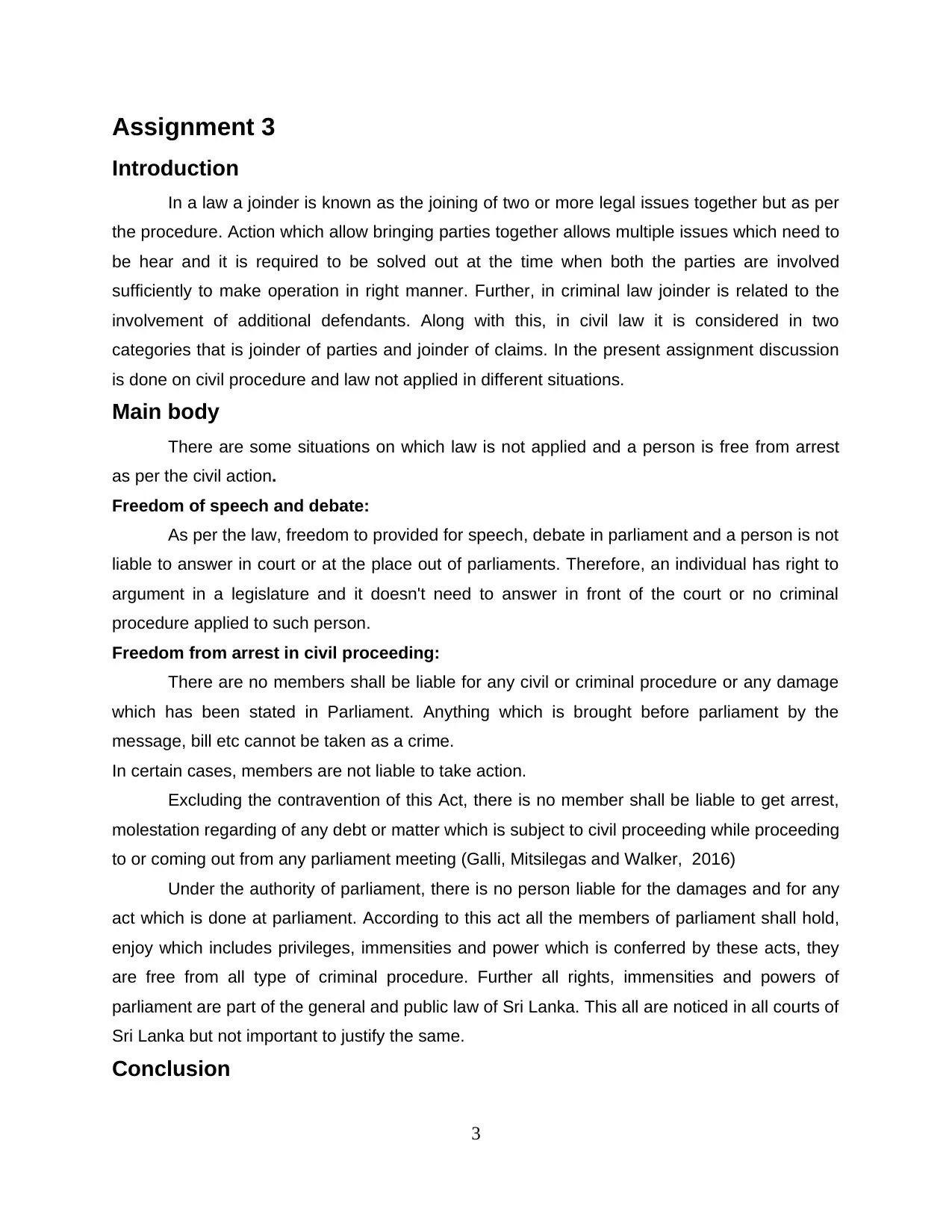
Assignment 3
Introduction
In a law a joinder is known as the joining of two or more legal issues together but as per
the procedure. Action which allow bringing parties together allows multiple issues which need to
be hear and it is required to be solved out at the time when both the parties are involved
sufficiently to make operation in right manner. Further, in criminal law joinder is related to the
involvement of additional defendants. Along with this, in civil law it is considered in two
categories that is joinder of parties and joinder of claims. In the present assignment discussion
is done on civil procedure and law not applied in different situations.
Main body
There are some situations on which law is not applied and a person is free from arrest
as per the civil action.
Freedom of speech and debate:
As per the law, freedom to provided for speech, debate in parliament and a person is not
liable to answer in court or at the place out of parliaments. Therefore, an individual has right to
argument in a legislature and it doesn't need to answer in front of the court or no criminal
procedure applied to such person.
Freedom from arrest in civil proceeding:
There are no members shall be liable for any civil or criminal procedure or any damage
which has been stated in Parliament. Anything which is brought before parliament by the
message, bill etc cannot be taken as a crime.
In certain cases, members are not liable to take action.
Excluding the contravention of this Act, there is no member shall be liable to get arrest,
molestation regarding of any debt or matter which is subject to civil proceeding while proceeding
to or coming out from any parliament meeting (Galli, Mitsilegas and Walker, 2016)
Under the authority of parliament, there is no person liable for the damages and for any
act which is done at parliament. According to this act all the members of parliament shall hold,
enjoy which includes privileges, immensities and power which is conferred by these acts, they
are free from all type of criminal procedure. Further all rights, immensities and powers of
parliament are part of the general and public law of Sri Lanka. This all are noticed in all courts of
Sri Lanka but not important to justify the same.
Conclusion
3
Introduction
In a law a joinder is known as the joining of two or more legal issues together but as per
the procedure. Action which allow bringing parties together allows multiple issues which need to
be hear and it is required to be solved out at the time when both the parties are involved
sufficiently to make operation in right manner. Further, in criminal law joinder is related to the
involvement of additional defendants. Along with this, in civil law it is considered in two
categories that is joinder of parties and joinder of claims. In the present assignment discussion
is done on civil procedure and law not applied in different situations.
Main body
There are some situations on which law is not applied and a person is free from arrest
as per the civil action.
Freedom of speech and debate:
As per the law, freedom to provided for speech, debate in parliament and a person is not
liable to answer in court or at the place out of parliaments. Therefore, an individual has right to
argument in a legislature and it doesn't need to answer in front of the court or no criminal
procedure applied to such person.
Freedom from arrest in civil proceeding:
There are no members shall be liable for any civil or criminal procedure or any damage
which has been stated in Parliament. Anything which is brought before parliament by the
message, bill etc cannot be taken as a crime.
In certain cases, members are not liable to take action.
Excluding the contravention of this Act, there is no member shall be liable to get arrest,
molestation regarding of any debt or matter which is subject to civil proceeding while proceeding
to or coming out from any parliament meeting (Galli, Mitsilegas and Walker, 2016)
Under the authority of parliament, there is no person liable for the damages and for any
act which is done at parliament. According to this act all the members of parliament shall hold,
enjoy which includes privileges, immensities and power which is conferred by these acts, they
are free from all type of criminal procedure. Further all rights, immensities and powers of
parliament are part of the general and public law of Sri Lanka. This all are noticed in all courts of
Sri Lanka but not important to justify the same.
Conclusion
3
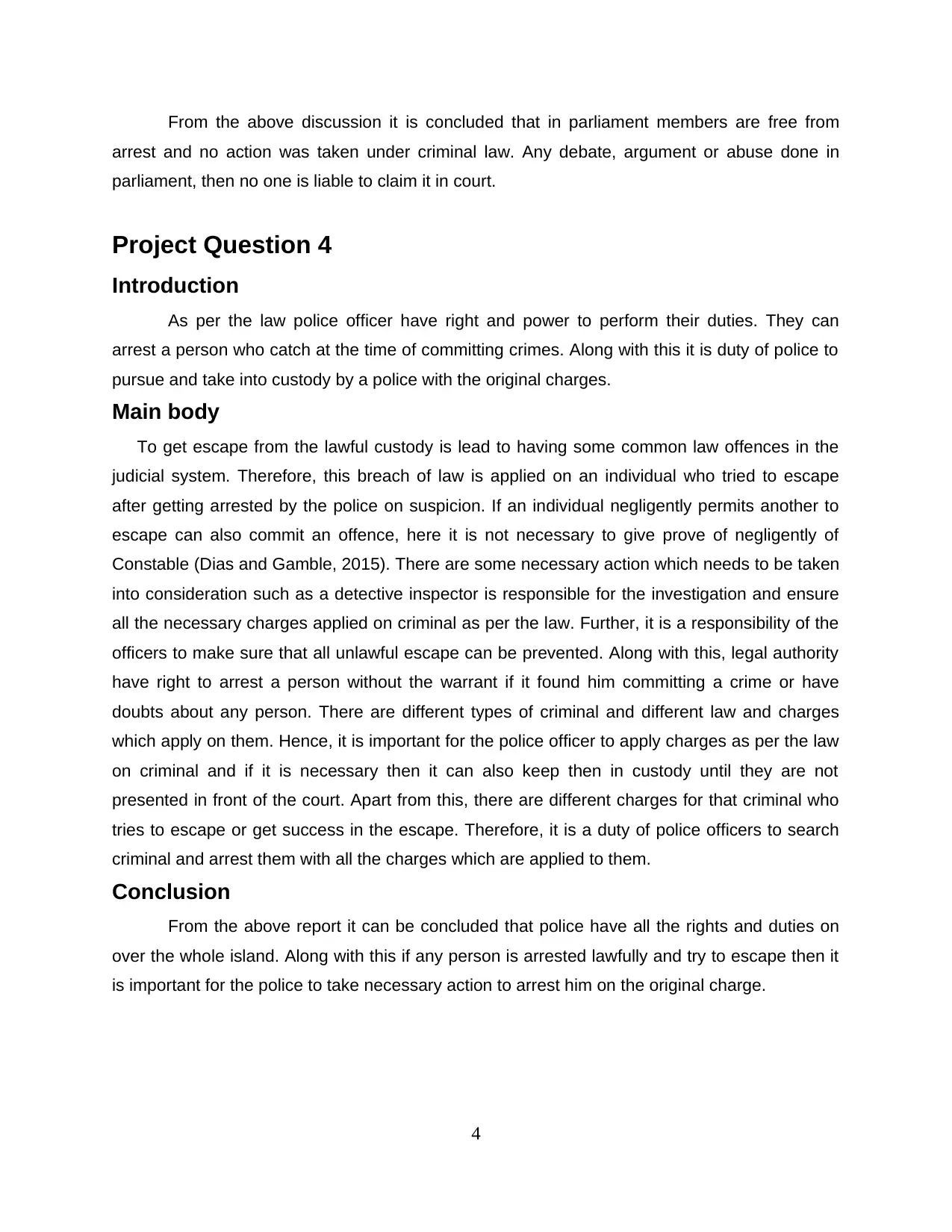
From the above discussion it is concluded that in parliament members are free from
arrest and no action was taken under criminal law. Any debate, argument or abuse done in
parliament, then no one is liable to claim it in court.
Project Question 4
Introduction
As per the law police officer have right and power to perform their duties. They can
arrest a person who catch at the time of committing crimes. Along with this it is duty of police to
pursue and take into custody by a police with the original charges.
Main body
To get escape from the lawful custody is lead to having some common law offences in the
judicial system. Therefore, this breach of law is applied on an individual who tried to escape
after getting arrested by the police on suspicion. If an individual negligently permits another to
escape can also commit an offence, here it is not necessary to give prove of negligently of
Constable (Dias and Gamble, 2015). There are some necessary action which needs to be taken
into consideration such as a detective inspector is responsible for the investigation and ensure
all the necessary charges applied on criminal as per the law. Further, it is a responsibility of the
officers to make sure that all unlawful escape can be prevented. Along with this, legal authority
have right to arrest a person without the warrant if it found him committing a crime or have
doubts about any person. There are different types of criminal and different law and charges
which apply on them. Hence, it is important for the police officer to apply charges as per the law
on criminal and if it is necessary then it can also keep then in custody until they are not
presented in front of the court. Apart from this, there are different charges for that criminal who
tries to escape or get success in the escape. Therefore, it is a duty of police officers to search
criminal and arrest them with all the charges which are applied to them.
Conclusion
From the above report it can be concluded that police have all the rights and duties on
over the whole island. Along with this if any person is arrested lawfully and try to escape then it
is important for the police to take necessary action to arrest him on the original charge.
4
arrest and no action was taken under criminal law. Any debate, argument or abuse done in
parliament, then no one is liable to claim it in court.
Project Question 4
Introduction
As per the law police officer have right and power to perform their duties. They can
arrest a person who catch at the time of committing crimes. Along with this it is duty of police to
pursue and take into custody by a police with the original charges.
Main body
To get escape from the lawful custody is lead to having some common law offences in the
judicial system. Therefore, this breach of law is applied on an individual who tried to escape
after getting arrested by the police on suspicion. If an individual negligently permits another to
escape can also commit an offence, here it is not necessary to give prove of negligently of
Constable (Dias and Gamble, 2015). There are some necessary action which needs to be taken
into consideration such as a detective inspector is responsible for the investigation and ensure
all the necessary charges applied on criminal as per the law. Further, it is a responsibility of the
officers to make sure that all unlawful escape can be prevented. Along with this, legal authority
have right to arrest a person without the warrant if it found him committing a crime or have
doubts about any person. There are different types of criminal and different law and charges
which apply on them. Hence, it is important for the police officer to apply charges as per the law
on criminal and if it is necessary then it can also keep then in custody until they are not
presented in front of the court. Apart from this, there are different charges for that criminal who
tries to escape or get success in the escape. Therefore, it is a duty of police officers to search
criminal and arrest them with all the charges which are applied to them.
Conclusion
From the above report it can be concluded that police have all the rights and duties on
over the whole island. Along with this if any person is arrested lawfully and try to escape then it
is important for the police to take necessary action to arrest him on the original charge.
4
⊘ This is a preview!⊘
Do you want full access?
Subscribe today to unlock all pages.

Trusted by 1+ million students worldwide
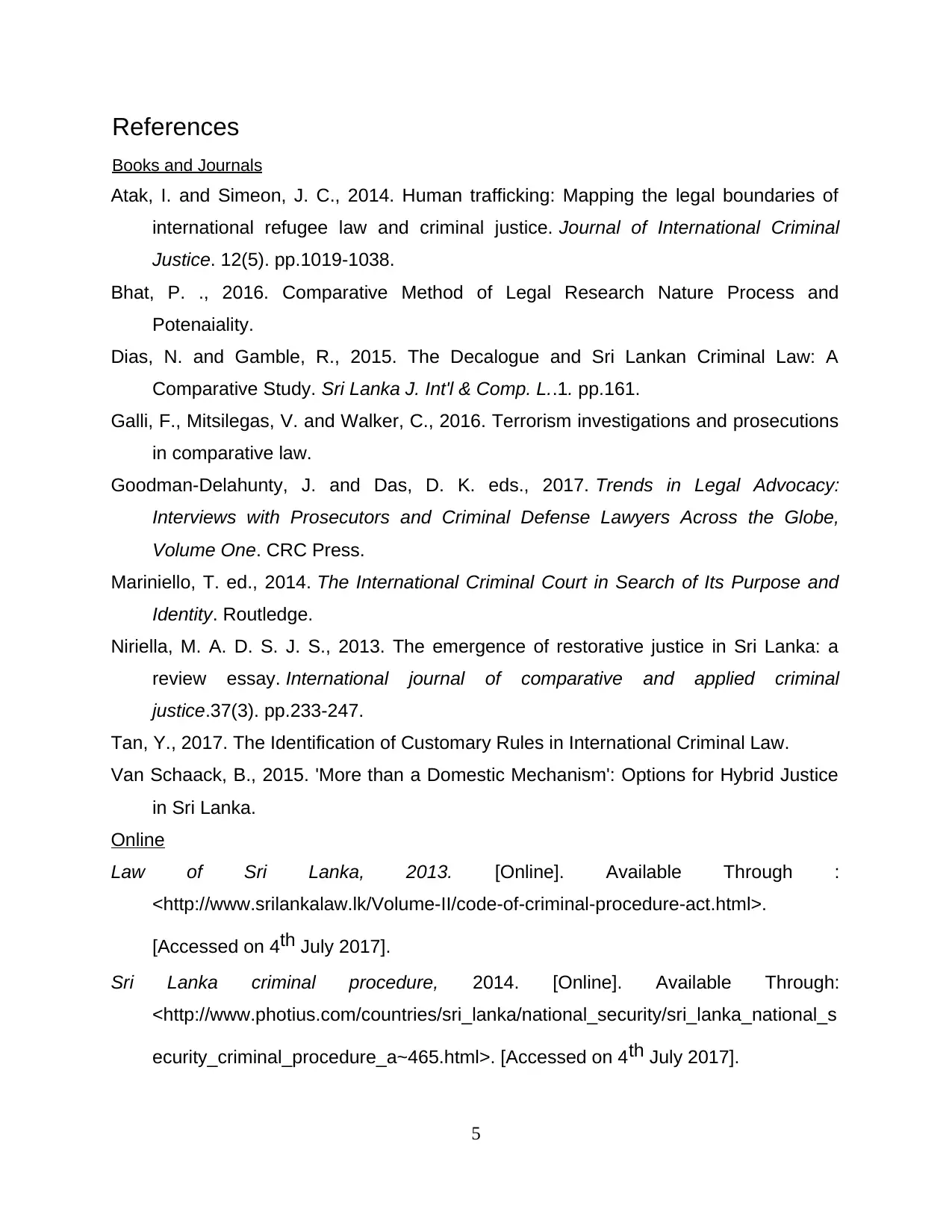
References
Books and Journals
Atak, I. and Simeon, J. C., 2014. Human trafficking: Mapping the legal boundaries of
international refugee law and criminal justice. Journal of International Criminal
Justice. 12(5). pp.1019-1038.
Bhat, P. ., 2016. Comparative Method of Legal Research Nature Process and
Potenaiality.
Dias, N. and Gamble, R., 2015. The Decalogue and Sri Lankan Criminal Law: A
Comparative Study. Sri Lanka J. Int'l & Comp. L..1. pp.161.
Galli, F., Mitsilegas, V. and Walker, C., 2016. Terrorism investigations and prosecutions
in comparative law.
Goodman-Delahunty, J. and Das, D. K. eds., 2017. Trends in Legal Advocacy:
Interviews with Prosecutors and Criminal Defense Lawyers Across the Globe,
Volume One. CRC Press.
Mariniello, T. ed., 2014. The International Criminal Court in Search of Its Purpose and
Identity. Routledge.
Niriella, M. A. D. S. J. S., 2013. The emergence of restorative justice in Sri Lanka: a
review essay. International journal of comparative and applied criminal
justice.37(3). pp.233-247.
Tan, Y., 2017. The Identification of Customary Rules in International Criminal Law.
Van Schaack, B., 2015. 'More than a Domestic Mechanism': Options for Hybrid Justice
in Sri Lanka.
Online
Law of Sri Lanka, 2013. [Online]. Available Through :
<http://www.srilankalaw.lk/Volume-II/code-of-criminal-procedure-act.html>.
[Accessed on 4th July 2017].
Sri Lanka criminal procedure, 2014. [Online]. Available Through:
<http://www.photius.com/countries/sri_lanka/national_security/sri_lanka_national_s
ecurity_criminal_procedure_a~465.html>. [Accessed on 4th July 2017].
5
Books and Journals
Atak, I. and Simeon, J. C., 2014. Human trafficking: Mapping the legal boundaries of
international refugee law and criminal justice. Journal of International Criminal
Justice. 12(5). pp.1019-1038.
Bhat, P. ., 2016. Comparative Method of Legal Research Nature Process and
Potenaiality.
Dias, N. and Gamble, R., 2015. The Decalogue and Sri Lankan Criminal Law: A
Comparative Study. Sri Lanka J. Int'l & Comp. L..1. pp.161.
Galli, F., Mitsilegas, V. and Walker, C., 2016. Terrorism investigations and prosecutions
in comparative law.
Goodman-Delahunty, J. and Das, D. K. eds., 2017. Trends in Legal Advocacy:
Interviews with Prosecutors and Criminal Defense Lawyers Across the Globe,
Volume One. CRC Press.
Mariniello, T. ed., 2014. The International Criminal Court in Search of Its Purpose and
Identity. Routledge.
Niriella, M. A. D. S. J. S., 2013. The emergence of restorative justice in Sri Lanka: a
review essay. International journal of comparative and applied criminal
justice.37(3). pp.233-247.
Tan, Y., 2017. The Identification of Customary Rules in International Criminal Law.
Van Schaack, B., 2015. 'More than a Domestic Mechanism': Options for Hybrid Justice
in Sri Lanka.
Online
Law of Sri Lanka, 2013. [Online]. Available Through :
<http://www.srilankalaw.lk/Volume-II/code-of-criminal-procedure-act.html>.
[Accessed on 4th July 2017].
Sri Lanka criminal procedure, 2014. [Online]. Available Through:
<http://www.photius.com/countries/sri_lanka/national_security/sri_lanka_national_s
ecurity_criminal_procedure_a~465.html>. [Accessed on 4th July 2017].
5
1 out of 7
Related Documents
Your All-in-One AI-Powered Toolkit for Academic Success.
+13062052269
info@desklib.com
Available 24*7 on WhatsApp / Email
![[object Object]](/_next/static/media/star-bottom.7253800d.svg)
Unlock your academic potential
Copyright © 2020–2026 A2Z Services. All Rights Reserved. Developed and managed by ZUCOL.





